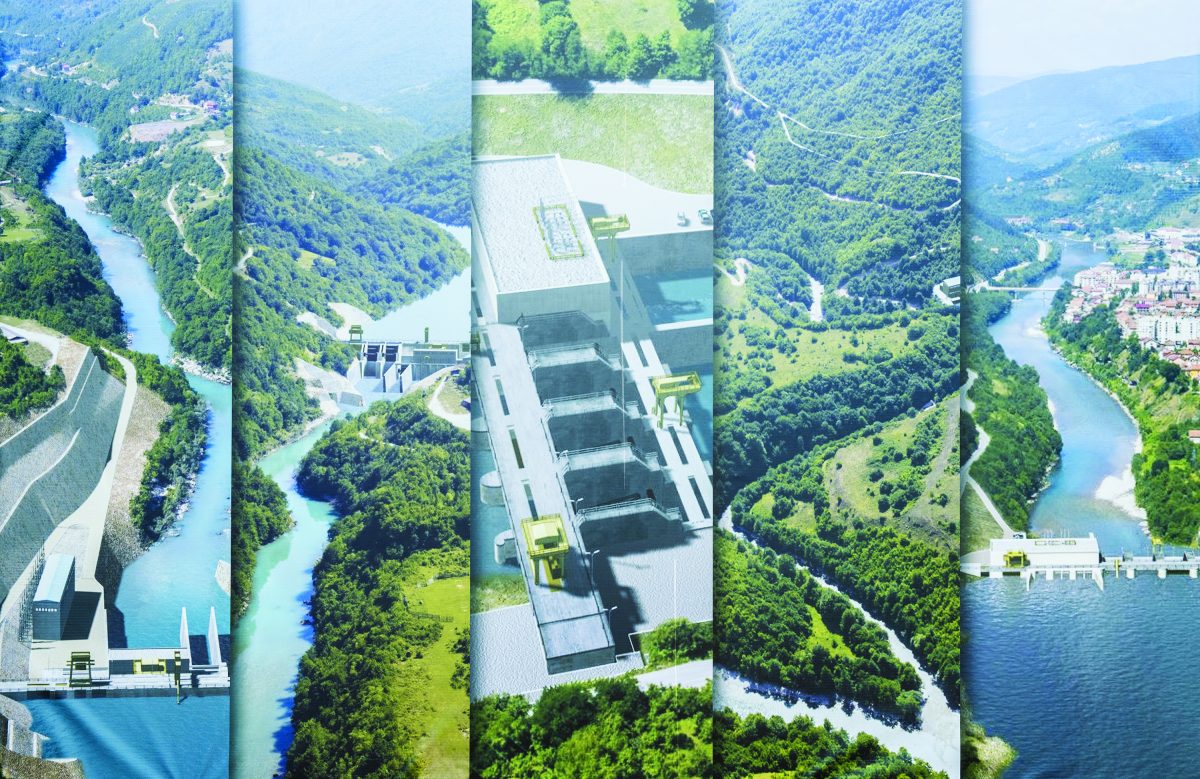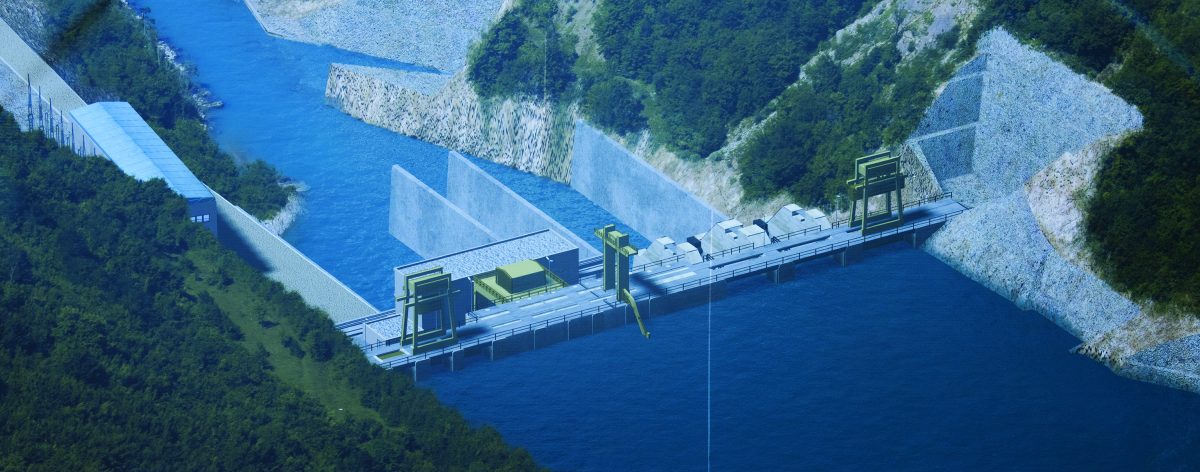EPS is quite interested in cooperation with neighboring electric power industries, and praises from Brussels are received for any indication regarding construction of a new green capacity. Nevertheless, in addition to these praises, there are still some obstructions coming from neighbors, aimed at the project which promotes regional interconnections, cooperation and renewable energy sources.

Together with its neighbours, Serbia tends to increase the energy capacity of the region and this is evidenced by projects such as construction of the “Gornja Drina“ System, i.e., its first hydropower plant “Buk Bijela“ with capacity of about 100 megawatts. The project is to be implemented by joint company the HPS “Gornja Drina“ where EPS has 51 percent share, and ERS 49 percent. The HPP “Buk Bijela“ is a part of the project for construction of three hydropower plants in the upper course of the Drina River, with total capacity of 200 megawatts and projected annual production at about 700 million kWh of electricity. This €520 million investment will bring green kilowatt hours and improve energy stability of Serbia, Republika Srpska and the region as a whole.
– Everything regarding construction of the HPP “Buk Bijela“, including granting a concession, has been done in accordance with legal and constitutional provisions – said Mr. Petar Djokic, a Minister of Energy and Mining of Republika Srpska.
– Except for a political, I see no other reason for justifying attempts from Sarajevo to obstruct construction of the HPP. Further, actions by the Constitutional Court representatives who support this by involving a completely unauthorized Commission for Concessions, which may grant concessions only for locations at the international borders or inter-entity lines, into this absolutely unnecessary situation, are difficult to comprehend. In this specific case, this Commission has no entitlement to request anything because in that area, the Drina River is neither a border with Serbia and Montenegro nor it is some inter-entity line. Everything is only under jurisdiction of Republika Srpska and its Commission for Concessions.
For construction of the HPP “Buk Bijela“, an Environmental Impact Assessment has been prepared and this project has a valid environmental permit, which also includes a special chapter with assessment of environmental impact on the territory of Montenegro. This chapter specifies that impacts which will develop during pre-works, construction works and during exploitation of the HPP “Buk Bijela“, as well as their intensity, will not generate elements of considerable, unfavorable transboundary environmental impact and impact on the protected areas of Montenegro. A conclusion is that in accordance with Annex 3 of the Convention of Environmental Impact Assessment in Transboundary Context ESPOO it is not required to prepare some special documents on impact by the HPP “Buk Bijela“ onto the territory of Montenegro.
Some environmental non-governmental organizations in Montenegro and Bosnia and Herzegovina, recognize hazards in construction of the HPP “Buk Bijela“, but previously, the Montenegrin Ministry of Capital Investments, as well as Ministry of Ecology, Spatial Planning and Urbanism did not have any objections to the project as long as water in accumulations does not go over the borders of Montenegro. The objections coming from environmentalists are not justified – however, additional explanations will be provided by the expert teams of Montenegro and Republika Srpska who will review design documents, structure and planned operation of the HPP “Buk Bijela“ during next month.
– Any technical-technological and engineering solution which provides guarantees that a future artificial lake will not have negative impacts on the Tara River and that there will not be flooding of any segment of the Tara River, is fully acceptable for us – said Mr. Danilo Mrdak, a State Secretary with the Ministry of Ecology, Spatial Planning and Urbanism of Montenegro.
At the same time, the Electric Power Industry of Serbia provides support for all regional projects and wants to share its experience in construction of new capacities with their colleagues from the region and in this way participates in development of the region. Besides the “Gornja Drina“ projects with the Electric Power Industry of Republika Srpska and a possible project “Srednja Drina“ with the Electric Power Industries of Bosnia and Herzegovina and Republika Srpska, EPS has a constructive approach to cooperation with the Electric Power Industry of Montenegro for the projects HPP “Komarnica“ and HPP “Kruševo“. It is planned for the HPP “Komarnica“, within the gorge of the mid-course of the Komarnica River, to have capacity of 172 megawatts and expected annual production of 213 million kWh. The estimated cost of this investment is between €260 million and €290 million. Preparation of a Basic Design with a Feasibility Study is ongoing and this should be completed by the end of this year.
– EPS is quite interested in cooperation with neighboring electric power industries, as well as in construction of new energy capacities in the region, primarily in projects for renewable energy sources – said Mr. Vladimir Marković, an assistant director of EPS and director of Key Investment Department. – Participation of EPS in local and regional projects reflects, primarily, in detailed and thorough preparation of a project, from an initiative for implementation and preliminary evaluations to preparation of investment and technical documents, in providing funds and obtaining all necessary permits.

Ms. Jelica Putniković, an editor of the portal “Energija Balkana“, notes that only lobbyists of the western capital are irritated with the announcement itself for a regional connection between electric power companies of the former Yugoslavia, and with the fact that this regional cooperation is forced by EPS.
– If joined, and should this be an issue for the professionals, and not for pliable politicians, four electric power industries (of Montenegro, Bosnia and Herzegovina, Republika Srpska and Serbia) by joint transformation into modern electric power companies, being profitable, will be able to provide energy safety to their clients – denotes Ms. Putnikovic. – EPS does not jeopardize any of neighboring electric power industries. For overcoming reduction in electricity production from coal, and for keeping a position of a pivot for local economies and companies which provide money for state funds, these electric power industries, including EPS, have to join their efforts. A regional cooperation and joint strategy of these four electric power industries is a way for their survival. Should they see EPS as a threat, and not as a company ready to develop together with its neighbours, there will not be any regional cooperation. Clients, who will pay significantly higher bills, will suffer, and merchants will celebrate.
Double standards
– Brussels and Energy Community criticize electric power industries in the region for electricity production from coal, they insist on closing thermal power plants and on complete liberalization of market – all this to open a path for placing electricity produced in the Western Europe countries. However, they insisist on constructing much more capacities for electricity production from renewable energy sources in these countries. But it appears that they do not have the same criteria when an investor in RES is a private entity and when it is some state owned electric power company. If this were some company from the EU, for example, there would probably be some delighted comments how this and that company helps Republika Srpska, i.e., Montenegro, in extending capacities for production of green energy – concluded Mr. Jelica Putnikovic, an editor of the portal “Energija Balkana“.